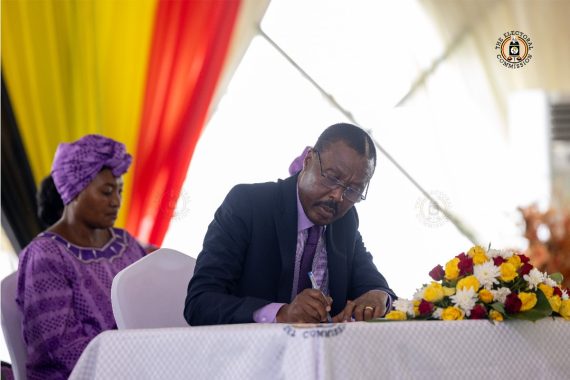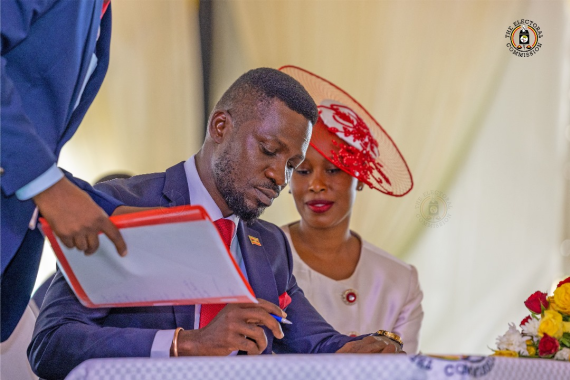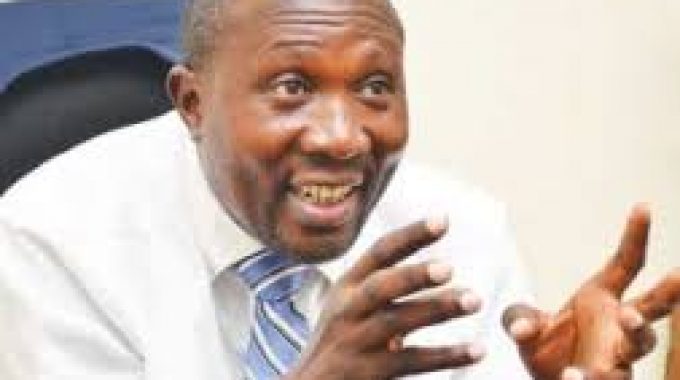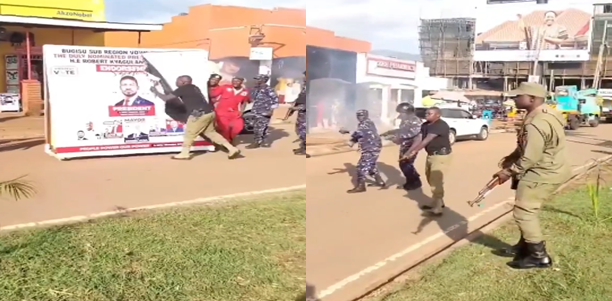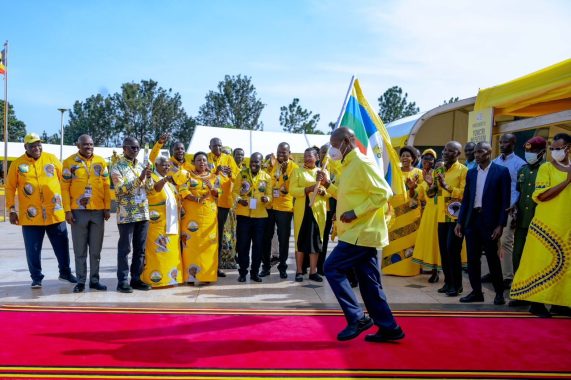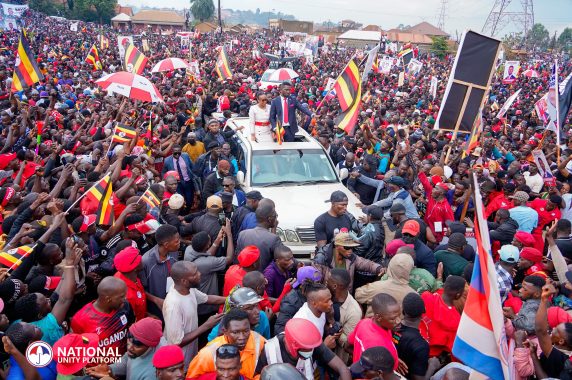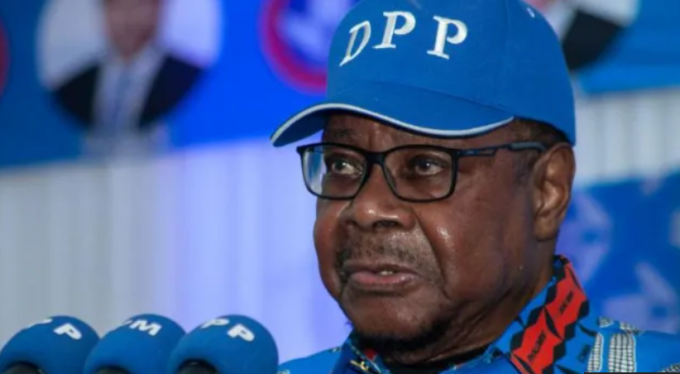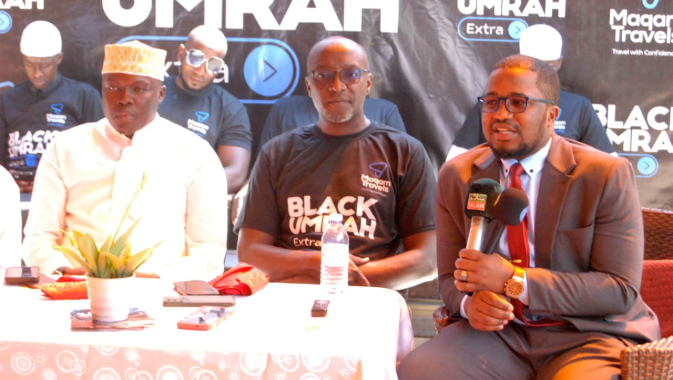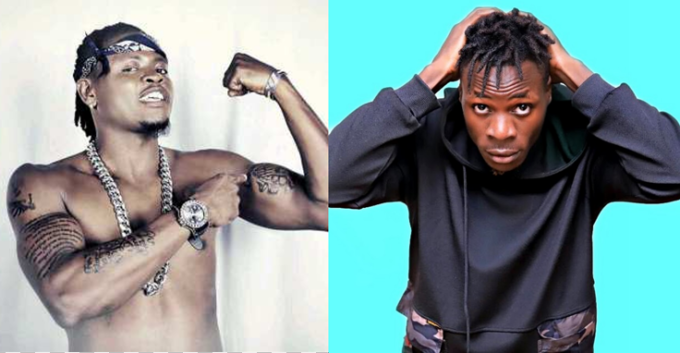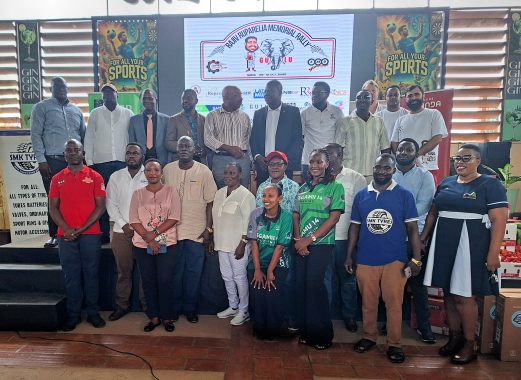M7 vs the new crew:
The drama, colour, and spectacle of Uganda’s presidential nominations have finally come to an end, and the stage is now fully set for the 2026 showdown.
For two days, all eyes were on the Electoral Commission grounds in Lweza–Lubowa as the big names and fresh challengers lined up, with Justice Simon Byabakama presiding over a political theatre that had the whole nation buzzing.
All candidates were nominated in accordance with the requirements of the Presidential Elections Act, Cap 179. The exercise was presided over by Justice Byabakama Mugenyi Simon, Chairperson of the Electoral Commission and Returning Officer for Presidential Nominations.
By the close of 24 September, eight faces had emerged to battle for Uganda’s top seat, promising a campaign season unlike any other.
At the heart of the drama was the ever-confident Yoweri Kaguta Museveni Tibuhaburwa, the man who has been in charge since 1986.
At eighty-one years of age, Museveni arrived with the familiar swagger of an incumbent who has seen it all. Supporters chanted his NRM slogans as he smiled and waved, determined to extend his long rule. His camp insists that Uganda is safer and stronger under his watch, pointing to roads, schools, electricity, and the economy. Whatever one thinks, Museveni is the mountain that every rival must climb, and his nomination confirmed yet again that he is not about to step aside.
Tibuhaburwa, the incumbent and flag bearer of the National Resistance Movement, was duly nominated, joining the race for what would be his seventh term in office. Museveni, born in 1944 in Mbarara, has been Uganda’s head of state since 1986 when his National Resistance Army toppled the previous regime.
M7 vs the new crew:
But this time the mountain is being challenged by a different crew. First came Robert Kasibante, the National Peasants Party candidate, young and insistent that he represents the ordinary Ugandan. He is a businessman and skills trainer, a man who speaks of land reform, empowering jobless youth, and chasing away corruption. His nomination was smooth, his message is simple, and his presence injects new blood into the race.
Alongside him was Elton Joseph Mabirizi, the outspoken engineer and born-again Christian. Mabirizi’s journey was almost cut short when questions emerged over his papers, but after a stormy process he secured the Commission’s nod. Known for mixing scripture with politics, he frames his campaign as a moral duty to restore values and truth in leadership.
He first came into the limelight in 2016 when he contested for the presidency, positioning himself as a moral crusader with a campaign rooted in Christian values.
Day two brought even more fireworks. Out of Sironko came James Nathan Nandala Mafabi, the sharp-tongued FDC legislator who has been in Parliament for more than two decades. Mafabi is no lightweight, armed with degrees in economics, taxation, law, and a reputation for grilling government officials on corruption. He is respected for his command of numbers and policies, feared by rivals for his blunt speech, and admired by his supporters for his consistency. To many, he is the man who can restore credibility to Uganda’s battered opposition.
Not far behind was Gregory Mugisha Muntu, a man of discipline and calm. Once Museveni’s army commander, he later broke ranks and became a key figure in opposition politics. Soft-spoken but principled, Muntu is running under the Alliance for National Transformation with a call for values, institutions, and decency in politics. His critics call him too gentle for Uganda’s rough arena, but his admirers see him as a statesman who could finally heal the divisions of the past.
Then came the rockstar politician himself, Robert Kyagulanyi Ssentamu, better known as Bobi Wine. Dressed sharply, smiling widely, he brought back the energy of 2021, when he led the youth in a dramatic, bitter face-off with Museveni. He lost then, but he insists he was robbed, and his supporters believe 2026 is the rematch that could change history. His chants of “People Power” were heard outside the EC gates, his youthful supporters promising that this time they will not be silenced.
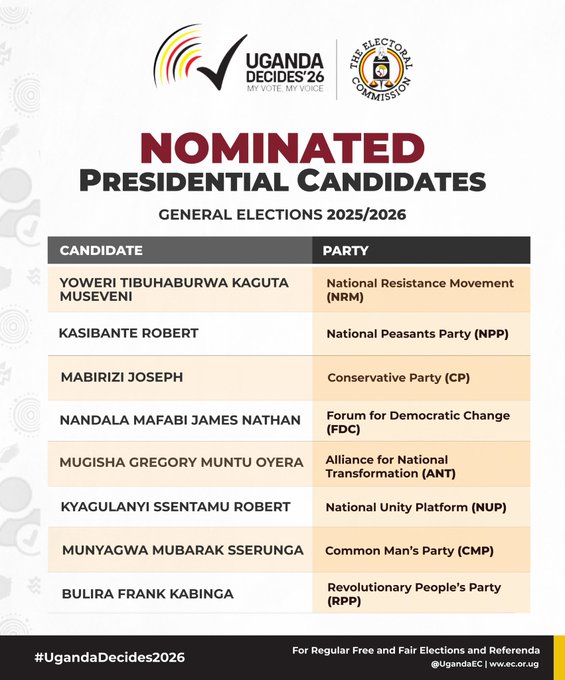
The day still had more drama. Mubarak Munyagwa, once a Kawempe mayor and later an FDC MP, strolled in with his trademark humour. Known as “Mugati gwa Bata,” he loves jokes, controversy, and street-level politics. Having fallen out with FDC, he is now running under the Common Man’s Party, insisting that he alone truly understands the pain of the ordinary Ugandan. He waved his nomination papers in the air, vowing that the common man’s voice would finally be heard.
Last but not least was Frank Kabinga Bulira, the little-known teacher-turned-politician whose boldness stole the show. He arrived with stacks of endorsements from across the country, insisting that federalism and decentralisation are the cure to Uganda’s problems. His catchphrase “Museveni must go” summed up his campaign, and although many still struggle to place his face, his passion and fearlessness have already earned him notice.
By the time the EC gates closed, Uganda had eight names in the presidential ring, each with a different story, style, and promise. The official campaign season will kick off on September 29, when programmes are harmonized between September 25 to 27th, and from then the real fireworks begin.
With Museveni defending his long rule, Kyagulanyi promising a youth revolution, Muntu and Mafabi banking on disciplined reform, Munyagwa and Kasibante rallying the grassroots, Mabirizi thundering from the pulpit, and Bulira preaching federalism, the 2026 race promises drama, suspense, and history in the making.





